2011外语教学理论基础907
907英语教学专业基础参考书目
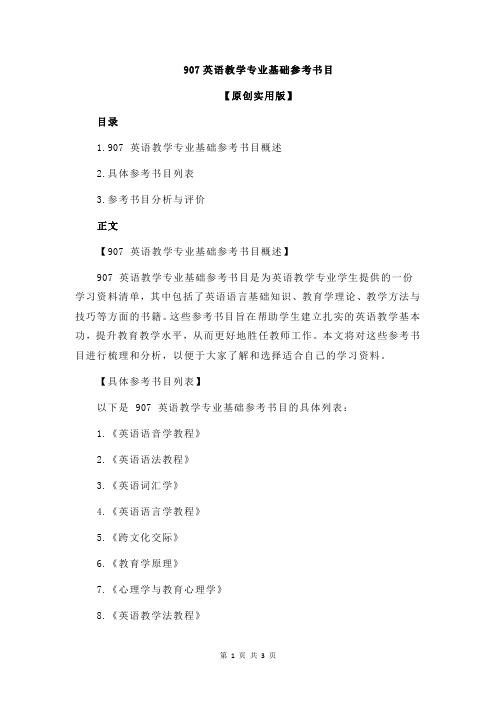
907英语教学专业基础参考书目【原创实用版】目录1.907 英语教学专业基础参考书目概述2.具体参考书目列表3.参考书目分析与评价正文【907 英语教学专业基础参考书目概述】907 英语教学专业基础参考书目是为英语教学专业学生提供的一份学习资料清单,其中包括了英语语言基础知识、教育学理论、教学方法与技巧等方面的书籍。
这些参考书目旨在帮助学生建立扎实的英语教学基本功,提升教育教学水平,从而更好地胜任教师工作。
本文将对这些参考书目进行梳理和分析,以便于大家了解和选择适合自己的学习资料。
【具体参考书目列表】以下是 907 英语教学专业基础参考书目的具体列表:1.《英语语音学教程》2.《英语语法教程》3.《英语词汇学》4.《英语语言学教程》5.《跨文化交际》6.《教育学原理》7.《心理学与教育心理学》8.《英语教学法教程》9.《英语课程设计与实施》10.《英语教师职业发展》【参考书目分析与评价】以上参考书目均是英语教学专业基础阶段的重要教材,对于培养学生的专业素质和教育教学能力具有重要意义。
以下是对部分参考书目的分析与评价:1.《英语语音学教程》:本书详细讲解了英语语音基础知识,包括发音原理、元音、辅音、重音等内容,有助于学生掌握标准的英语发音。
2.《英语语法教程》:本书系统介绍了英语语法的基本规则和用法,既适合初学者入门,也适合进阶学习。
3.《英语词汇学》:本书深入探讨了英语词汇的构成、用法和记忆方法,对扩大词汇量和提高语言表达能力有极大帮助。
4.《英语语言学教程》:本书从语言学的角度分析英语,使学生了解语言的本质和演变规律,提高语言表达的准确性。
5.《跨文化交际》:本书主要讨论了不同文化背景下的交际策略和技巧,有助于提高学生的跨文化交际能力。
6.《教育学原理》:本书介绍了教育学的基本原理和教育方法,为学生从事教育工作奠定理论基础。
7.《心理学与教育心理学》:本书从心理学的角度分析教育教学过程,有助于学生更好地理解学生心理和教育方法。
初试自命题科目参考书目

《概率论与数理统计》2010第四版,盛骤编,高教岀版社。
818计算机程序设计ห้องสมุดไป่ตู้言
《C++程序设计》2011第二版,谭浩强编,清华大学岀版社。
821运筹学
《运筹学》2012第四版,钱颂迪编,清华大学出版社。
822生产管理
《现代生产管理学》2018第四版,潘家轺编,清华大学岀版社;《生产运作管理》2017第五版, 陈荣秋编,机械工业岀版社。
921普通化学
《普通化学》2011第六版,浙江大学普通化学教研室组编,高教岀版社。
922高分子物理
《高分子物理》2007第三版,何曼君编,复旦大学出版社。
923冶金学
《现代冶金学》2005第一版,朱苗勇编,冶金岀版社。
924土木工程综合(5选1)
A《混凝土结构原理》2012第二版,刘立新等编,武汉理工大学出版社。B《土力学》2013第二版,李广信编,清华大学岀版社。C《抗震工程学》2015第二版,沈聚敏编,中国建 筑工业岀版社。D《钢结构基本原理》2005第二版,沈祖炎编,中国建筑工业岀版社。E
946工程传热学
《传热学》2006第四版,杨世铭等编,高教岀版社。
947船舶柴油机
《船舶柴油机》2008版,朱建元编,人民交通出版社。
948机械原理
《机械原理》2006第八版,孙恒编,高教岀版社。
951思想政治理论
《马克思主义基本原理概论》、《毛泽东思想和中国特色社会主义理论体系概论》、本书编 写组、2018年第一版,高等教育岀版社。
805船舶原理与结构
《船舶原理》静力学部分,2003版,盛振邦编,上海交大岀版社;《船舶与海洋平台结构》2008版,杨永祥编,国防工业岀版社。
山东师范大学全日制教育硕士考研就业如何

山东师范大学全日制教育硕士考研就业如何本文系统介绍山东师大全日制教育硕士考研难度,山东师大全日制教育硕士就业方向,山东师大全日制教育硕士学费介绍,山东师大全日制教育硕士考研参考书,山东师大全日制教育硕士考研初试经验五大方面的问题,凯程山东师大全日制教育硕士老师给大家详细讲解。
特别申明,以下信息绝对准确,凯程就是王牌的教育硕士考研机构!一、山东师大全日制教育硕士就业怎么样?山东师大教育硕士专业就业前景良好,就业渠道广阔,就业机会多。
随着国家对教育的越来越重视和教师待遇的不断提高,教育硕士专业正在逐渐成为一门热门专业。
就业方向:全国高校、高职、中职、高专、中专里做教师、行政、辅导员;教育科学研究所、研究室里做研究人员;编辑部、报社、期刊社、杂志社做编辑;教育部、教育厅、教育局、人事考试院做工作人员或研究人员;中小学里做管理人员或教师;公司里做项目工作;培训机构做相关培训等。
二、山东师大全日制教育硕士考研难度大不大,跨专业的人考上的多不多?总体来说,山东师大的教育硕士考研难度不大,院校招生量较大,2015年山东师大全日制教育硕士专业招生人数172人,考试题目难度不高。
据统计,录取的人基本都是跨专业的学生,其专业课认真复习后,及格很容易。
据凯程从山东师大内部统计数据得知,每年教育硕士考研的考生中95%是跨专业考生,在录取的学生中,基本都是跨专业考的。
在考研复试的时候,老师更看重跨专业学生自身的能力,而不是本科背景。
其次,教育硕士考研考试科目里,333教育综合本身知识点难度并不大,跨专业的学生完全能够学得懂。
即使本科师范类的同学,专业课也不见得比你强多少(大学学的内容本身就非常浅)。
在凯程辅导班里很多这样三凯程生,都考的不错,而且每年还有很多二本院校的成功录取的学员,主要是看你努力与否。
所以记住重要的不是你之前学得如何,而是从决定考研起就要抓紧时间完成自己的计划,下定决心,就全身心投入,要相信付出总会有回报。
907英语教学专业基础

907英语教学专业基础(实用版)目录1.907 英语教学专业基础的重要性2.907 英语教学专业基础的内容3.如何学习和掌握 907 英语教学专业基础4.907 英语教学专业基础对英语教师的影响正文【907 英语教学专业基础的重要性】907 英语教学专业基础是英语教育专业中至关重要的一部分,它是英语教师在教育过程中必须掌握的基本知识和技能。
907 英语教学专业基础不仅包括英语语言基础知识,如语音、语法、词汇等,还包括英语教学法、教育心理学等专业领域知识。
学习和掌握 907 英语教学专业基础,对于提高英语教师的教学质量和效果具有重要意义。
【907 英语教学专业基础的内容】907 英语教学专业基础主要包括以下几个方面的内容:1.英语语言基础知识:包括语音、语法、词汇等。
语音是英语语言的基础,语法是语言的规则,词汇是语言的组成部分。
掌握这些基础知识,对于英语教师来说至关重要。
2.英语教学法:英语教学法是英语教学的基础,它包括各种教学方法和技巧。
例如,语法翻译法、听说法、功能法、任务型教学法等。
掌握这些教学法,可以使英语教师在教学过程中更加得心应手。
3.教育心理学:教育心理学是研究学习者心理过程的一门学科。
掌握教育心理学知识,可以帮助英语教师更好地理解学生的学习心理,提高教学效果。
【如何学习和掌握 907 英语教学专业基础】学习和掌握 907 英语教学专业基础需要英语教师付出持续的努力。
首先,教师需要参加相关的专业培训,学习英语教学专业基础理论知识。
其次,教师需要在实际教学过程中不断实践,将理论知识运用到教学中。
同时,教师还需要不断反思自己的教学过程,总结经验教训,不断提高自己的教学水平。
【907 英语教学专业基础对英语教师的影响】907 英语教学专业基础对英语教师的影响是深远的。
首先,学习和掌握 907 英语教学专业基础可以提高教师的教学水平,使教师在教学过程中更加得心应手。
其次,907 英语教学专业基础可以提高教师的职业素养,使教师具备更高的教育教学能力。
学科教育(英语)考研907
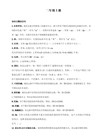
2.缺点:认知法作为一个独立的外语教学法体系还不够完善,在理论和实践方面都需要进一步充实。从理论说,认知法理论基础的一些理论还处在形成和发展阶段,如转换生成语法体系怎样运用到教学实践中去等问题还需要进一步探索。从实践上讲,缺乏与该理论原则相适应的配套教材。该法在美国多用于教本国人学外语,而在国内外教他族人学英语基本上不用此法。
5. 活动内容涉及面广,信息量大,有助于拓宽学生的知识面。
6. 在活动中学习知识,培养人际交往、思考、决策和应变能力,有利于学生的全面发展。
7. 在任务型教学活动中,在教师的启发下,每个学生都有独立思考、积极参与的机会,易于保持学习的积极性,养成良好的学习习惯,
3. 有助于培养翻译能力和写作能力。
3、缺点是:
1. 忽视口语教学,学生的语音语调差,不利于培养学生用外语进行交际的能力;
2. 教学方式单一,学生容易失去兴趣。
二、直接法(Direct Method)
1、历史:直接法也叫自然法、心理法、口语法、改良法。针对翻译法不能培养学生听说能力的缺点,直接法于19世纪末在欧洲产生。它包含三个方面的意思:直接学习、直接理解和直接应用。其主要特点是:不允许使用母语,用动作和图画等直观手段解释词义和句子。
2、优点是:
采用各种直观教具,广泛运用接近实际生活的教学方式,有助于培养用外语思维的能力;强调直接学习和直接应用,注重语言实践练习,学生学习积极性高,学习兴趣浓厚;重视口语和语音教学,能有效地培养学生的语言运用能力。
3、缺点是:排斥母语,使学生对一些抽象和复杂的概念难以理解;没有明晰的语法解释,导致学生说出的话语法错误较多。
东北师范研究生843英语教学专业基础参考书目
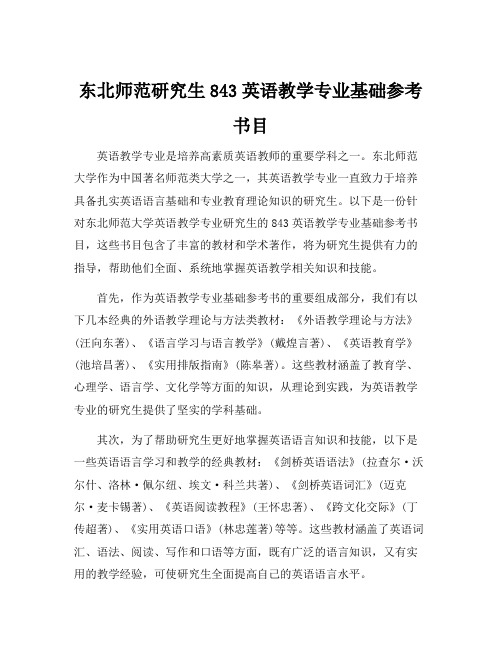
东北师范研究生843英语教学专业基础参考书目英语教学专业是培养高素质英语教师的重要学科之一。
东北师范大学作为中国著名师范类大学之一,其英语教学专业一直致力于培养具备扎实英语语言基础和专业教育理论知识的研究生。
以下是一份针对东北师范大学英语教学专业研究生的843英语教学专业基础参考书目,这些书目包含了丰富的教材和学术著作,将为研究生提供有力的指导,帮助他们全面、系统地掌握英语教学相关知识和技能。
首先,作为英语教学专业基础参考书的重要组成部分,我们有以下几本经典的外语教学理论与方法类教材:《外语教学理论与方法》(汪向东著)、《语言学习与语言教学》(戴煌言著)、《英语教育学》(池培昌著)、《实用排版指南》(陈皋著)。
这些教材涵盖了教育学、心理学、语言学、文化学等方面的知识,从理论到实践,为英语教学专业的研究生提供了坚实的学科基础。
其次,为了帮助研究生更好地掌握英语语言知识和技能,以下是一些英语语言学习和教学的经典教材:《剑桥英语语法》(拉查尔·沃尔什、洛林·佩尔纽、埃文·科兰共著)、《剑桥英语词汇》(迈克尔·麦卡锡著)、《英语阅读教程》(王怀忠著)、《跨文化交际》(丁传超著)、《实用英语口语》(林忠莲著)等等。
这些教材涵盖了英语词汇、语法、阅读、写作和口语等方面,既有广泛的语言知识,又有实用的教学经验,可使研究生全面提高自己的英语语言水平。
另外,为了帮助研究生更好地了解英语教学的实践和研究,以下是一些与英语教学相关的学术著作和教材:《英语教材评析与教学设计》(丁传超著)、《英语教学反思与教师发展》(李硕著)、《英语写作与教学理论与实践》(戈梦洁、薛静著)、《浅谈英语听力教学策略与方法》(刘光宇著)等等。
这些教材既涵盖了英语教学的研究成果,又关注了教师的职业发展和实际教学中的问题,为研究生提供了宝贵的教学经验和思路。
综上所述,以上所列的东北师范大学研究生843英语教学专业基础参考书目,涵盖了外语教学理论与方法、英语语言学习与教学以及英语教学实践与研究的各个方面。
2011广州大学外国语学院考试大纲及参考书目

英语词汇、语法、阅读、完型填空、英美概况
翻译与写作
1.翻译(40%):英译汉、汉译英;
2.写作(60%)议论文(就所给出的题目写出不少于500字的作文)。
课程与教学论
教育学专业基础综合
按教育部指定的考试大纲。
方向5(英语教育):
复试专业课:语言学和应用语言知识
1.语言学基本概念和基础理论;
2.英语教学法知识。
参考书目:王道俊、郭文安主编:《教育学》,人民教育出版社2009年;孙培青主编:《中国教育史》,华东师范大学出版社2009年版;张斌贤主编,王晨副主编:《外国教育史》,教育科学出版社2008年;2、陈琦、刘儒德主编:《教育心理学》,高等教育出版社2005年。
应用语言学知识:
1.二语习得基本概念和基础理论;
2.外语教学基本概念和基础理论;
3.英语课堂教学案例分析。
语言学基础
引论、语音学、音系学、形态学、句法学、语义学、语用学,参考书目:刘润清、文旭,2006,《新编语言学教程》,外语教学与研究出版社。(考试范围:本书的1-6章)
广州大学英语语言文学2011年考研招生简章招生目录
招生年份:2011本院系招收人数:48英语语言文学专业招收人数:20专业代码:050201
2011广州大学外国语学院考试大纲及参考书目
发布人:圣才学习网发布日期:2011-02-16 16:01共103人浏览[大] [中] [小]
考试内容范围
专业名称
初试考试科目名称
初试考试内容范围
复试考试内容范围
英Hale Waihona Puke 语言文学日语词汇、语法、阅读理解、填空、翻译、写作。参照日本语能力考级3~2级水平
专业方向基本技能:
招收学科教学英语专业的学校及初试科目
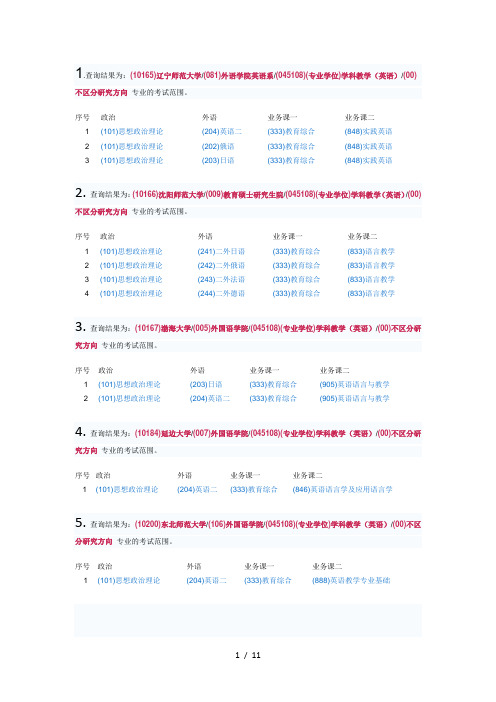
不区分研究方向专业的考试范围。
序号政治外语业务课一业务课二1 (101)思想政治理论(204)英语二(333)教育综合(848)实践英语2 (101)思想政治理论(202)俄语(333)教育综合(848)实践英语3 (101)思想政治理论(203)日语(333)教育综合(848)实践英语2.查询结果为:(10166)沈阳师范大学/(009)教育硕士研究生院/(045108)(专业学位)学科教学(英语)/(00)不区分研究方向专业的考试范围。
序号政治外语业务课一业务课二1 (101)思想政治理论(241)二外日语(333)教育综合(833)语言教学2 (101)思想政治理论(242)二外俄语(333)教育综合(833)语言教学3 (101)思想政治理论(243)二外法语(333)教育综合(833)语言教学4 (101)思想政治理论(244)二外德语(333)教育综合(833)语言教学3.查询结果为:(10167)渤海大学/(005)外国语学院/(045108)(专业学位)学科教学(英语)/(00)不区分研究方向专业的考试范围。
序号政治外语业务课一业务课二1 (101)思想政治理论(203)日语(333)教育综合(905)英语语言与教学2 (101)思想政治理论(204)英语二(333)教育综合(905)英语语言与教学4.查询结果为:(10184)延边大学/(007)外国语学院/(045108)(专业学位)学科教学(英语)/(00)不区分研究方向专业的考试范围。
序号政治外语业务课一业务课二1 (101)思想政治理论(204)英语二(333)教育综合(846)英语语言学及应用语言学5.查询结果为:(10200)东北师范大学/(106)外国语学院/(045108)(专业学位)学科教学(英语)/(00)不区分研究方向专业的考试范围。
序号政治外语业务课一业务课二1 (101)思想政治理论(204)英语二(333)教育综合(888)英语教学专业基础的考试范围。
2016年山东师范大学教育学考研学术和专硕情况分析

山东师范大学教育学考研必备信息勤思汇总(一)院校简介:山东师范大学研究生教育始于1955年,是山东省较早开展研究生教育的高校之一。
1981年获得硕士学位授予权,是全国首批被批准的硕士学位授予单位;1996年成为全国首批教育硕士专业学位试点单位;1998年获得博士学位授予权。
截至2012年,学校拥有10个博士学位授权一级学科,29个硕士学位授权一级学科;1个国家重点学科(中国现当代文学)、1个国家重点(培育)学科(教育学原理)、22个山东省“十二五”重点学科、15个校级重点学科。
是国务院学位委员会、教育部批准的教育硕士、公共管理硕士、工商管理硕士、体育硕士、艺术硕士、汉语国际教育硕士、工程硕士、翻译硕士、国际商务硕士、应用心理硕士、新闻与传播硕士、旅游管理硕士等12个专业学位培养单位。
学校现有22个学院、2个中心,共计24个研究生培养单位,在校全日制博士生350人,硕士生4527人,非全日制研究生1353人。
(二)招生情况分析:专硕:学术必备:《教育学基础》第二版教育科学出版社十二所重点师范合编《教育学》人民教育出版社王道俊、郭文安《当代教育心理学》高等教育出版社刘儒德、陈琦《中国教育史》华东师范大学出版社孙培青《外国教育史教程》人民教育出版社吴式颖《教育研究方法导论》安徽教育出版社裴娣娜专硕必备:教育学原理王道俊、郭文安主编:《教育学》,人民教育出版社2009年中国教育史孙培青主编:《中国教育史》,华东师范大学出版社2009年版王炳照等著:《简明中国教育史》,北京师范大学出版社2007年版外国教育史张斌贤主编,王晨副主编:《外国教育史》,教育科学出版社2008年教育心理学张大均主编:《教育心理学》,人民教育出版社2005年山东师范大学坐落在历史文化名城济南。
建校半个多世纪以来,学校植根齐鲁文化之沃土,汲取泉城人文之灵韵,与祖国共奋进,与时代同发展,谱写了以教书育人、创新发展为主旋律的华美篇章。
温馨提示:如果想报考山东地区的同学,山师大很值得考虑。
2022年华南师范大学907英语教学专业基础考研真题和答案

2022年华南师范大学907英语教学专业基础考研真题和答案2022年华南师范大学《907英语教学专业基础》[专业硕士]考研全套内容简介•全国名校英语教学论考研真题汇总说明:本科目考研真题不对外公布(暂时难以获得),通过分析参考教材知识点,精选了有类似考点的其他院校相关考研真题,部分真题提供了答案详解。
2.教材教辅•王蔷《英语教学法教程》(第2版)笔记和课后习题(含考研真题)详解•王蔷《英语教学法教程》(第2版)配套题库(含考研真题)说明:以上为本科目参考教材配套的辅导资料。
•试看部分内容第1章语言和语言学习1.1 复习笔记本章要点:1 The way we learn language s我们习得语言的方式2 Views on language语言观点3 The structural view of language结构主义语言理论4 The functional view of language功能主义语言理论5 The interactional view of language交互语言理论6 Common views on language learning关于语言学习的普遍观点7 Pro ce ss-o rien ted theo ries and condition-o rien ted theo ries强调过程的语言学习理论和强调条件的语言学习理论8 The behaviorist theory行为主义学习理论9 Cognitive theory认知学习理论10 Constructivi st theory建构主义学习理论11 Socio-constru cti vist theo ry社会建构主义理论12 Qualities of a good language teacher一个好的语言老师必备的素养13 Teacher’s p rofessional devel opment教师专业技能发展本章考点:我们如何习得语言;结构主义语言理论;功能主义语言理论;交互语言理论;关于语言学习的普遍观点;强调过程的语言学习理论和强调条件的语言学习理论;行为主义学习理论;认知学习理论;建构主义学习理论;社会建构主义理论;成为一个好的语言老师所要具备的基本素质;教师专业技能发展图。
温州大学907语文课程与教学论2020年考研专业课初试大纲
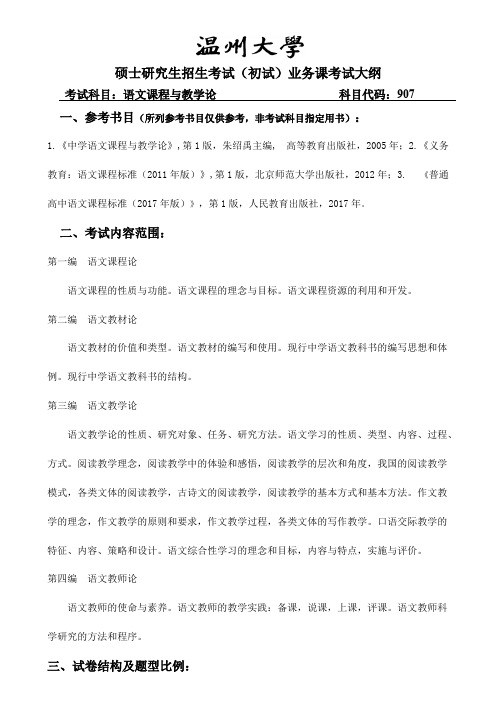
硕士研究生招生考试(初试)业务课考试大纲考试科目:语文课程与教学论科目代码:907
一、参考书目(所列参考书目仅供参考,非考试科目指定用书):
1.《中学语文课程与教学论》,第1版,朱绍禹主编, 高等教育出版社,2005年;
2.《义务教育:语文课程标准(2011年版)》,第1版,北京师范大学出版社,2012年;
3.《普通高中语文课程标准(2017年版)》,第1版,人民教育出版社,2017年。
二、考试内容范围:
第一编语文课程论
语文课程的性质与功能。
语文课程的理念与目标。
语文课程资源的利用和开发。
第二编语文教材论
语文教材的价值和类型。
语文教材的编写和使用。
现行中学语文教科书的编写思想和体例。
现行中学语文教科书的结构。
第三编语文教学论
语文教学论的性质、研究对象、任务、研究方法。
语文学习的性质、类型、内容、过程、方式。
阅读教学理念,阅读教学中的体验和感悟,阅读教学的层次和角度,我国的阅读教学模式,各类文体的阅读教学,古诗文的阅读教学,阅读教学的基本方式和基本方法。
作文教学的理念,作文教学的原则和要求,作文教学过程,各类文体的写作教学。
口语交际教学的特征、内容、策略和设计。
语文综合性学习的理念和目标,内容与特点,实施与评价。
第四编语文教师论
语文教师的使命与素养。
语文教师的教学实践:备课,说课,上课,评课。
语文教师科学研究的方法和程序。
三、试卷结构及题型比例:。
山东师范大学全日制教育硕士考研参考书目一览

山东师范大学全日制教育硕士考研参考书目一览本文系统介绍山东师大全日制教育硕士考研难度,山东师大全日制教育硕士就业方向,山东师大全日制教育硕士学费介绍,山东师大全日制教育硕士考研参考书,山东师大全日制教育硕士考研初试经验五大方面的问题,凯程山东师大全日制教育硕士老师给大家详细讲解。
特别申明,以下信息绝对准确,凯程就是王牌的教育硕士考研机构!五、山东师大全日制教育硕士考研参考书是什么?山东师大教育硕士考研参考书很多人都不清楚,这里凯程老师给大家整理出来了:333教育综合参考书:①教育学原理:《教育学》,王道俊、郭文安编人民教育出版社②中国教育史:《中国教育史》,孙培青编华东师范大学出版社《简明中国教育史》,王炳照等著北京师范大学出版社③外国教育史:《外国教育史》,张斌贤、王晨副编教育科学出版社④教育心理学:《教育心理学》,张大均编人民教育出版社《教育心理学》,陈琦、刘儒德编高等教育出版社以上参考书比较多,实际复习的时候,请按照凯程老师指导的重点进行复习,有些内容是不考的,帮助你减轻复习压力,提高复习效率。
四、山东师大全日制教育硕士考研辅导班有哪些?对于山东师大教育硕士考研辅导班,业内最有名气的就是凯程。
很多辅导班说自己辅导教育硕士,您直接问一句,山东师大教育硕士参考书有哪些,大多数机构瞬间就傻眼了,或者推脱说我们有专门的专业课老师给学生推荐参考书,为什么当场答不上来,因为他们根本就没有辅导过山东师大教育硕士考研,更谈不上有山东师大教育硕士考研的考研辅导资料,有考上山东师大教育硕士的学生了。
在业内,凯程的山东师大教育硕士考研非常权威,基本上考山东师大教育硕士的同学们都了解凯程,2015年共有166人考取目标院校。
凯程有系统的《333教育综合讲义》《333教育综合应试题库》《333教育综合应试解析》《333教育综合掌中宝》,也有系统的考研辅导班,及对山东师大教育硕士深入的理解和及时的考研信息。
不妨同学们实地考察一下。
2014山东师范大学 学科教学(英语) 初试+复试

随着复试结果的公布,这场历时将近8个月的考研攻坚战终于落下了帷幕,总算努力都没有白费。
这段经历无疑是难忘的,经历过迷茫,纠结,伴随着欢笑、汗水,自己也得到了锻炼和提高。
有很多即将要考这个专业的同学问过我一些问题,现在统一解答一下,希望对大家有所帮助,明年可以实现自己的目标。
山东师范大学学科教学(英语)的考试科目:1、政治2、英语(二)3、333教育综合4、907外语教学理论基础【初试篇】政治和英语二都是全国统考,由于我将近9月份才开始复习备考,时间比较紧张,所以这两门都没有花很多时间。
我是英语专业的,英语二相对简单,买了一本英语二的阅读,平时每天坚持做点儿阅读,不用很多,坚持就好。
买了一本星火的《复习思路与全真考场》,这本书不错还带四套真题,一直都很喜欢星火的书。
个人认为这些就够了。
政治完全是最后突击的,刚刚及格,建议想用政治提分的同学还是不要用这种方法。
建议肖秀荣的最后四套题一定要看一下,连续几年都押中了大题。
关于政治有很多复习经验贴,这里就不再多说了。
333教育综合,大纲指定参考书一共六本:1王道俊、郭文安主编:《教育学》,人民教育出版社2009年。
2孙培青主编:《中国教育史》,华东师范大学出版社2009年版3王炳照等著:《简明中国教育史》,北京师范大学出版社2007年版4张斌贤主编,王晨副主编:《外国教育史》,教育科学出版社2008年5张大均主编:《教育心理学》,人民教育出版社2005年。
6陈琦、刘儒德主编:《教育心理学》,高等教育出版社2005年。
现在开始准备,时间相对充足,还是建议看课本,对照着大纲来看,大纲上有的详细看,没有的简略看。
书上写的比较详细,便于理解。
333教育综合都是考记忆的东西,在理解的基础上背诵更加容易,记忆也更加牢固。
本人是非师范类的,所有这些课本对我来说都是陌生的,所以我主要时间都花在背诵333教育综合上了。
今年山师的题还是按部就班很传统,没有很偏的题,只要平时对书理解的透彻,就可以有不错的成绩。
2011年山东师范大学908外语教学理论基础考研真题及详解【圣才出品】

2011年山东师范大学908外语教学理论基础考研真题及详解I. Explain the following terms. (共7道小题,每题5分,共计35分)1. Deductive teaching【答案】Deductive teaching is a more traditional form of teaching. In deductive teaching you typically provide information (lecture), share specific examples of the concept or skills being taught, then, allow students to practice the skill being taught. This is a more teacher-centered model of teaching that is rule driven. Some of the positives of this method are that it is time saving and gets to the point of the lesson easily.2. Positive transfer【答案】Positive transfer is where the two habits share common aspects, such the knowing one will help with learning the other. It may help or facilitate language learning in another later situation, and may occur when both the native language and the target language have the same form.3. Reflective teaching【答案】A reflective approach to teaching is one in which teachers and student teachers collect data about teaching, examine their attitudes, beliefs, assumptions and teaching practices, and use the information obtained as a basis for criticalreflection about teaching.4. Communicative strategies【答案】Communicative strategies are defined as mutual attempts of two interlocutors to agree on a meaning in situations where requisite meaning strategies do not seem to be shared. From the perspective of error resources, CS is defined as the process of inter-lingual transfer and the context of learning as a learner tries to get a message through to a hearer or reader.5. Student-centered teaching【答案】Student-centered teaching aims to develop learner autonomy and independence by putting responsibility for the learning path in the hands of students. Student-centered instruction focuses on skills and practices that enable lifelong learning and independent problem-solving. Student-centered teaching emphasizes the learner’s critical role in constructing meaning from new information and prior experience.Student-centered teaching puts students’ interests first, acknowledging student voice as central to the learning experience. In a student-centered teaching pace, students choose what they will learn, how they will learn, and how they will assess their own learning. This is in contrast to traditional education, also dubbed “teacher-centered learning”, which situates the teacher as the primarily “active” role while students take a more “passive”, receptive role. In a teacher-centeredclassroom, teachers choose what the students will learn, how the students will learn, and how the students will be assessed on their learning. In contrast, student-centered teaching requires students to be active, responsible participants in their own learning and with their own pace of learning.6. Cultural awareness【答案】Cultural Awareness is the foundation of communication and it involves the ability of standing back from ourselves and becoming aware of our cultural values, beliefs and perceptions.7. Context【答案】The relevant constraints of the communicative situation that influence language use, language variation, and discourse summary.II. Write brief answers to the questions. (共3道小题,每题15分,共计45分)1. Why do we say that behaviorism of learning was a powerful influence on the development of the audio-lingual approach?【答案】The audio-lingual approach is a method of foreign or second language teaching which emphasizes the teaching of speaking and listening before reading and writing. Behaviorism of learning is the basis of the audio-lingual approach. Behaviorism proposes that learning language is a process of habit formation, which includes three stages: imitation, reinforcement and formation. It processes thatcertain traits of living things, and in this case humans could be trained through a system of reinfourcement—correct use of a trait would receive positive feedback while incorrect use of that trait would receive negative feedback. Audio-lingual approach follows such process. Students are asked to do lots of drills of speaking and listening and to imitate. And the the habits about language are formed.2. What is your understanding of the significance of inter-language?【答案】Proposed by Selinker, the concept of inter-language was established as learner’s independent system of the second language, which is neither the native language nor the second language, but a continuum or approximation from one extreme of mother-tongue to the other of the second language. What learners prodece, correct or wrong, are evidence of the approximation from their language to the target language, it is imperfect compare with the target language either. Therefore, inter-language can help learners realize the gap between their own language and the target language.Inter-language can help language learners and teachers understand the relationship between native language, inter-language and foreign language. The formation of inter-language is affected by both native language and target language, their relationship is more complicated. It seems that inter-language detives from native language and target language, but is inferior to the latter.Inter-language also sheds lights on latent psychological structure. Relevant behavioral events in a psychology of second-language learning should be madeidentified with the aid of theoretical constructs which assume the major features of the psychological structure of an adult whenever he attempts to understand SL sentences or to produce them, we assume that there is such a psychological structure and that it is latent in the brain, activitated when one attempts to learn a second language.On the other hand, inter-language is comparatively independent from native language and with the help of inter-langue, the native language can be predicted and analysed.3. State briefly the reasons why Error Analysis replaced Contrastive Analysis and the general procedures involved in Error Analysis.【答案】There are some reasons which cause Contrastive Analysis to be replaced. Firstly, there were doubts concerning the ability of CA to predict errors in language learning. It was shown in research that not all errors were caused by the interference by the mother tongue. It is obvious that the psychological and linguistic basis of CA is clearly defective, because it is based on behaviorism and structuralism. Secondly, there were a number of theoretical criticisms regarding the feasibility of comparing languages and the methodology of contrastive attacked by Chomsky and others. And the terms “stimulus”, “response”, “reinforcement”were rejected as an inadequate explanation of language learning. In addition to this, there were objections to the validity of equationg difference with difficulty on the one hand and difficulty with error on the other. Thirdly, there were doubts aboutwhether CA had any practical worth to language teaching. CA studies concentrated largely on grammatical aspects—the phonological level, the morphemic level and the syntactical level. There is practically little contrastive analysis above the sentence level, let alone the textual or discourse level. In addition, if a majority of learner errors are not caused by interference, then CA is of limited value. However, the main doubt about CA from a pedagogic point of view has arisen from the chaning attitudes to the role of errors in language learning. CA was based on the need to avoid error, but if error is seen as a positive aspect—a necessary developmental process of language learning, then why should we devise a teaching program to prevent it?The procedure of error analysis consists of the following steps:(1) Recognition. Dealing with a sentence produced by the language learner, we should first ask whether the sentence is grammatically correct. If the answer is negative, then errors exist. If the answer is positive, then we further check whether the sentence is appropriate in the communicative context. A negative answer indicates a mistake.(2) Description. If the erroneous sentence is intelligible, we compare it with the correct sentence produced by a native speaker and list the errors and mistakes. If the meaning of the sentence is not clear, we may refer to the learner’s native language to find out what he means and carry out a contrastive analysis. Taking into consideration the use of language in social contexts, we can describe mistakes as well as errors.。
907英语教学专业基础

907英语教学专业基础Title: Analysis of the Fundamentals of English Teaching Specialization [907]Introduction:The field of English teaching has witnessed significant evolution in recent years due to globalization and the increasing demand for English language proficiency. In this article, we will delve into the fundamentals of the English teaching specialization [907], exploring the core components, curriculum, teaching methods, and the role of technology in enhancing English language learning.I. Overview of English Teaching Specialization [907]:A. Definition and Scope:[907] refers to the specialized field of English language teaching, covering key areas such as linguistics, pedagogy, methodology, and curriculum design.B. Importance and Demand:The globalization era has emphasized the necessity of English language proficiency, making the teaching of English a vital need in various educational contexts worldwide. This demand ensures therelevance and value of the English teaching specialization.II. Core Components of [907]:A. Linguistics:1. Phonetics and Phonology:- Study of sounds and sound systems in English.- Focuses on English pronunciation, intonation, and stress.2. Morphology and Syntax:- Analysis of word formation and sentence structures.- Understanding how words combine to form meaningful sentences.3. Semantics and Pragmatics:- Investigation of word meanings and how they relate to context.- Developing knowledge of appropriate language use in different situations.B. Pedagogy and Methodology:1. Teaching Approaches:- Traditional vs. communicative approaches.- Incorporating task-based and student-centered learning methods.2. Lesson Planning and Materials:- Designing effective lesson plans aligned with learning objectives.- Selecting appropriate materials to support language acquisition.C. Assessment and Evaluation:1. Formative and Summative Assessment:- Continuous monitoring of student progress.- Final evaluation to measure language proficiency.2. Feedback and Error Correction:- Providing constructive feedback to enhance language development.III. Curriculum Design in [907]:A. Language Skills Development:1. Listening:- Introducing authentic audio materials to develop listening comprehension.- Engaging students in various types of listening activities.2. Speaking:- Providing opportunities for meaningful, interactive speaking practice.- Incorporating role-plays, debates, and discussions toenhance fluency.3. Reading:- Encouraging extensive reading for vocabulary expansion and reading comprehension.- Incorporating reading strategies to improve understanding.4. Writing:- Fostering writing skills through guided and independent writing activities.- Teaching different genres and writing techniques.B. Culture and Literature:1. Promoting Intercultural Competence:- Encouraging understanding and respect for different cultures.- Exploring social values, traditions, and customs.2. Literary Analysis:- Introducing prominent English literary works.- Developing critical thinking and interpretation skills.IV. The Role of Technology in English Teaching:A. Digital Tools in the Classroom:1. Interactive whiteboards and projectors.2. Computer-assisted language learning programs.3. Online resources for language practice and skill development.B. Blended Learning:1. Combining traditional classroom teaching with online platforms.2. Facilitating independent learning and flexibility.C. Multimodal Approaches:1. Utilizing visual and audio aids to enhance language learning.2. Incorporating multimedia elements into lessons. Conclusion:The English teaching specialization [907] encompasses various fundamental components, including linguistics, pedagogy, methodology, and curriculum design. By integrating effective teaching approaches with technology, educators can cater to the demands of modern learners and enhance their English language proficiency. As the global need for English language skills continues to grow, the importance of [907] in equipping future English language teachers is undeniable.。
907英语教学专业基础参考书目

907英语教学专业基础参考书目摘要:I.引言- 介绍907英语教学专业基础参考书目II.英语教学理论- 书目1:《英语教学法》- 书目2:《英语教育心理学》- 书目3:《英语教学策略》III.英语教学实践- 书目4:《英语课堂教学设计与实践》- 书目5:《英语口语教学》- 书目6:《英语写作教学》IV.英语教育技术与资源- 书目7:《英语教育技术》- 书目8:《英语多媒体教学》- 书目9:《网络英语教学》V.英语教师专业发展- 书目10:《英语教师教育与发展》- 书目11:《英语教师专业素养》- 书目12:《英语教育研究方法》VI.结论- 总结参考书目对英语教学专业基础学习的重要性正文:【引言】在我国,英语作为一门重要的外语学科,在教育领域占据着举足轻重的地位。
为了提高英语教学质量,提升英语教师的专业素养,以下是为907英语教学专业基础提供的参考书目。
【英语教学理论】英语教学理论是英语教学专业的基础知识,包括英语教学法、教育心理学和教学策略等方面的内容。
其中,《英语教学法》(书目1)详细介绍了各种英语教学方法,帮助教师选择合适的教学方式;《英语教育心理学》(书目2)分析了学生的心理特点,为教师提供有针对性的教学建议;《英语教学策略》(书目3)则从策略层面为教师提供了实用的教学技巧。
【英语教学实践】英语教学实践是指在实际教学中运用理论知识,包括课堂教学设计与实践、英语口语教学、英语写作教学等方面的内容。
例如,《英语课堂教学设计与实践》(书目4)指导教师如何设计有效的教学活动;《英语口语教学》(书目5)和《英语写作教学》(书目6)分别针对英语口语和写作能力的培养提供了丰富的教学方法和实例。
【英语教育技术与资源】随着科技的发展,英语教育技术与资源在教学中发挥着越来越重要的作用。
教师可以参考《英语教育技术》(书目7)、《英语多媒体教学》(书目8)和《网络英语教学》(书目9)等书籍,了解并掌握现代教育技术的应用,以提高教学质量。
809-英语教学专业基础

阅读技能:阅读的形式及特点,有效阅读,阅读策略,阅读教学的原则与模式,读前、读中及读后各环节常用的教学活动形式;
写作技能:写作教学中的现存问题、写作教学中的可用方法及活动形式、如何激发学生的写作兴趣、常用的设计写作课的教学技巧。
7.语言综合技能的实施:
词汇教学:理解“词汇”的真正含义是什么?主动词汇与被动词汇的差异,在导入、讲解和巩固词汇过程中常用的方法和策略。
教学技能的教学方法与技巧:听力技能、说的技能、阅读技能和写作技能的教学方法与技巧
听力技能:可听的内容,听力内容的特点,听力教学的原则与模式,听力教学的原则与方法,听前、听中、听后各环节所采用的教学活动形式;
强调语言综合技能的意义以及如何综合语言技能。
8.品德教育:
利用所给教材实施品德教育的形式;教师、学校在学生品德教育中所起的作用。
9.教学评价的形式及方法:
教学评价的概念、目的、标准、原则、方法及分类
10.多元智能理论
10.多元智能理论
三、题型结构
1.选择题:从所给选项中选出一个正确的选项(共10题,每题2分,共20分)
二、考试内容
1.语言观及语言学习观:
语言观:语言观的种类(结构主义语言理论、功能主义语言理论、交互语言理论)、不同类型语言观的特点(如结构主义语言理论更强调语言的结构性—语音、词法、句法等)等;
语言学习观:语言学习观的种类(行为主义理论、认知理论、建构理论、社会建构理论)、代表人物、主要观点、与语言观的关系、以及由此衍生出来的相应教学理论(如结构主义语言理论—行为主义理论—听说教学法三者之间的关系就较好地诠释了语言观、语言学习观及教学理论之间的内在联系)。
2011学科教学(英语)908英语教育理论

3.Nevile Grant suggests four alternatives when the teacher decides the textbook is not appropriate.They are:_______7________,replace the textbook with one of the teacher’s own,__________8___________,and________9__________.
1.According toGardnerand Lambert,there are two kinds of motivations.What are they?Please explain.How important is the students’motivation in language learning?
.Judge whether each of the following statements is true or false.Put a T for true or F for false.(10 points)
1.The theory of learning underlying Audiolingualism is behaviorism.
(10 points)
You should answer this question based on your ownunderstanding and the ideasin the book.
2.What questions do we need to ask for each activity we intend to do is the lesson?
